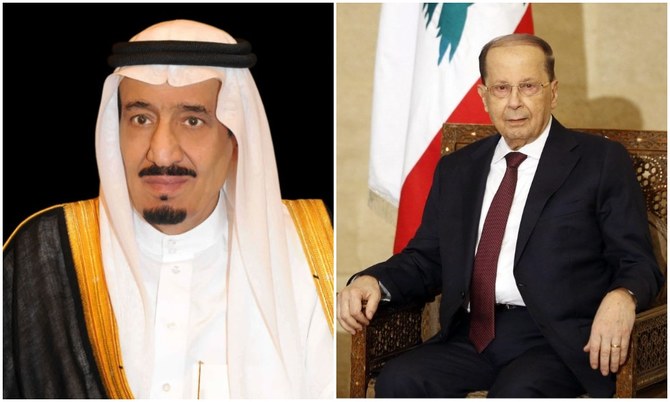
By NAJIA HOUSSARI — arabnews.com — BEIRUT: Lebanon’s President Michel Aoun congratulated King Salman on the occasion of Saudi National Day, praising his efforts to “strengthen Arab solidarity, which is what we need the most today to address the challenges facing our region and the world.” Aoun stressed “the brotherly ties between Saudi Arabia and Lebanon, since the era of King Abdulaziz Al-Saud, who laid the foundation for unity and convergence, the values that your Kingdom has remained committed to toward our nation and people.” His warm comments follow recent statements where Aoun expressed his rejection “for Lebanon to be the source of anything that might offend or harm Saudi Arabia and Gulf countries,” after the Saudi government’s decision in April to ban the entry of Lebanese fruits and vegetables into or via its territories over drug smuggling. Meanwhile, Prime Minister Najib Mikati’s government obtained the parliament’s vote of confidence this week, based on the ministerial statement that stressed the need to “promote the Lebanese relations with Arab countries, activate the historic cooperation among Arab countries and urge Arab brothers to support the Lebanese during these difficult times.”
Aoun is expected to deliver via video a speech on Friday at the UN General Assembly in New York from his office, to express “Lebanon’s position regarding local and regional developments as well as the topics on the session’s agenda.” Mikati headed to Paris on Thursday, his first official visit after the formation of the government, and is expected to meet French President Emmanuel Macron on Friday. France exerted intense pressure on Lebanese politicians to form a government in line with the initiative launched by Macron in the aftermath of the Beirut blast, which rocked the country last August. On the eve of Mikati’s visit to the French capital, the International Support Group for Lebanon welcomed the formation of the new government and the parliament’s vote of confidence in the administration and its program.
The ISG urged “Lebanon’s leaders to move quickly to alleviate the burden of socio-economic hardship on the people of Lebanon and restore basic services, to prepare for fair and transparent elections to take place on time in 2022, and to initiate the critical reforms needed to restore trust and deliver justice, stability and prosperity for the Lebanese people and to pave the way for enhanced international support.” Recalling its statement of Aug. 3, the ISG reiterated “the importance of swiftly completing the investigation into the Beirut port explosion.” Meanwhile, Lebanon’s state electricity company warned on Thursday that the entire country was facing a total blackout by the end of the month as fuel oil reserves dwindled.
The company can generate less than 500 megawatts from fuel oil it secured through a deal with Iraq, it said. Worsening fuel shortages have left the Lebanese with little if any state-supplied power for the past few months. Much of the country now relies on private generators. The EDL said its reserves of both Grade A and Grade B fuel had reached a critical point and had run out already in the Jiyeh plant and the electricity-generating ships of Fatmagül and Orhan Bey, which have now stopped production. “Reserves are also about to run out in the Zouk thermal plant and in the power-generation facilities in Zouk and Jiyeh, which will also be forced to stop production soon,” it said.
EDL said that “the Iraqi fuel to be imported following an agreement signed between Lebanon and Iraq can only generate 500 megawatts, which is not enough to secure the network’s stability and thus, the network will be at risk of total collapse at any moment.” It added: “If things persist, there is a high risk of reaching total and complete darkness by the end of September.”
EDL held Lebanon’s central bank responsible for not securing dollars in exchange for “the surplus of local currency accumulated in the company’s account to generate power.” Elsewhere, Hezbollah has continued to provide fuel for municipalities and hospitals hoping to procure Iranian diesel through the Al-Amana company, which is under US sanctions. The administration of a hospital in northern Lebanon denied having received fuel through Al-Amana.



